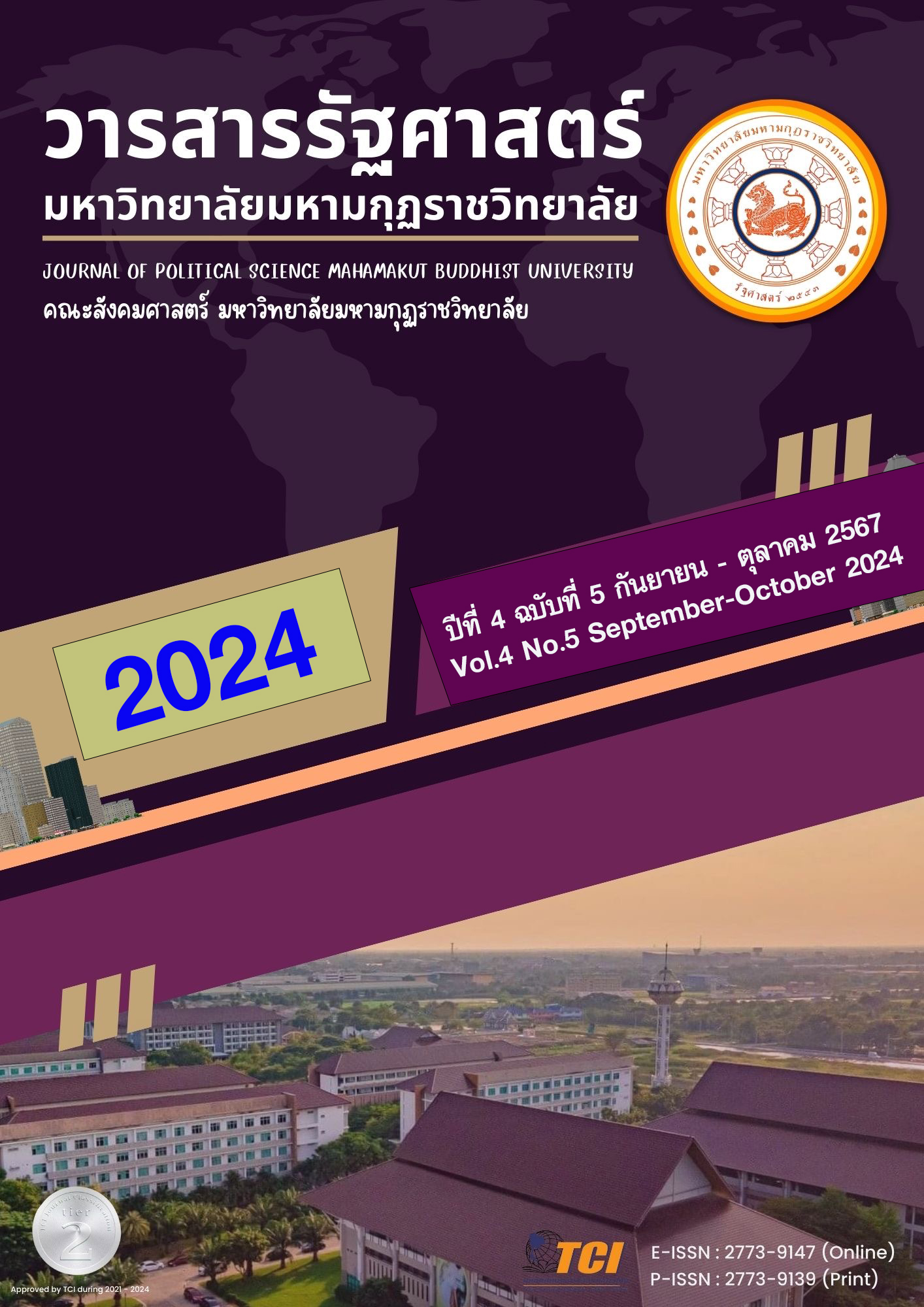A MODEL FOR APPLYING THE PRINCIPLES OF BUDDHISM TO STUDENTS' SELF-DISCIPLINE MAHAMAKUT BUDDHIST UNIVERSITY YASOTHON BUDDHIST COLLEGE
Main Article Content
Abstract
Protecting and nurturing oneself among students in the digital age is one of the crucial issues because there have been significant changes in lifestyles and relationships due to the use of technology and digital media. We can observe various problems arising, such as online safety risks, lack of proper knowledge and understanding about technology usage, exposure to inappropriate media and content, online time management issues, and lack of supervision and guidance from adults. This research aims to study the level of application of Buddhist moral principles and recommendations for self-governance among students and faculty members at Yosothon College of Religious Studies. The findings reveal that the application of Buddhist moral principles for self-governance has a significantly high average value, indicating correct thoughts and actions aligned with the moral principles of Buddhism. This includes the application of principles such as the Four Noble Truths, the Eightfold Path, moral precepts, and the principle of mindfulness in daily life effectively. Students demonstrated good understanding and practice of Buddhist moral principles in various aspects, and a good self-governance model entails self-awareness, self-understanding, and self-control, being mindful, and residing in non-aversion. Applying Buddhist moral principles in self-governance is a significant process in personal development to attain value and balance, leading to stable positive transformations in life.
Article Details

This work is licensed under a Creative Commons Attribution-NonCommercial-NoDerivatives 4.0 International License.
References
กรมวิชาการ กระทรวงศึกษาธิการ. (2521) หลักสูตรใหม่. เอกสารแนะนำหลักสูตร ฉบับปรับปรุง. กรุงเทพมหานคร: โรงพิมพ์กรมการศาสนา.
กรมส่งเสริมวัฒนธรรม. (2564). เล่าสู่กันฟังเรื่อง ครองตน ครองคน ครองงาน หลักปฏิบัติของผู้บริหารและคนทำงาน. สืบค้นเมื่อวันที่ 2 มกราคม 2566.จาก:http://www.culture.go.th/culture_th/ewt_news.php?nid=5512&filename=i
เจริญชัย กุลวัฒนาพร. (2565). การประยุกต์ใช้หลักพุทธธรรมกับการบริหารจัดการความขัดแย้งในองค์กร. วารสารวิจยวิชาการ. 4(3), 283-296.
พระครูพิพัฒน์จันทรังษี, อภินันท์ จันตะนี, และอริย์ธัช เลิศรวมโชค. (2565). พระพุทธศาสนากับการบริหารทรัพยากรมนุษย์. วารสารพุทธศาสตร์ มจร อุบลราชธานี. 4(2), 50-58.
พระธนิษฐ์ ศรีสมบัติ, จิราภรณ์ ผันสว่าง และสุเทพ เมยไธสง. (2566). การประยุกต์ใช้หลักพุทธธรรมในการครองตน ครองคน และครองงานของบุคลากรในสถานศึกษา สังกัดสำนักงานเขตพื้นที่การศึกษาประถมศึกษาร้อยเอ็ด เขต 1. วารสารพุทธปรัชญาวิวัฒน์. 7(1), 1-11.
พระธรรมเมธาภรณ์. (ระแบบ ฐิตญาโณ). (2553). บริหารตน บริหารคน บริหารงาน. (พิมพ์ครั้งที่ 3). กองทุนไตรรัตนานุภาพ. กรุงเทพมหานคร: สำนักพิมพ์แปดสิบเจ็ด จำกัด.
พระเสกสรร ฐานยุตฺโต, สุทัศน์ ประทุมแก้ว, และพระพรสวรรค์ ฐิติญาโณ. (2565). การประยุกต์ใช้หลักพุทธธรรมในการพัฒนาคุณธรรมของนักเรียนโรงเรียนขุขันธ์ราษฎร์บำรุง อำเภอขุขันธ์จังหวัดศรีสะเกษ. วารสาร มจร อุบลปริทรรศน์. 7(3), 94-102.
วิเชียร เกตุสิงห์. (2540). สถิติวิเคราะห์สาหรับการวิจัย. (พิมพ์ครั้งที่ 3). กรุงเทพมหานคร:จุฬาลงกรณ์มหาวิทยาลัย.
วีระยุทธ กาญจน์ชูฉัตร. (2560). โลกาภิวัตน์เก่า ชาตินิยมใหม่ คือทางแก้ไขโลกปั่นป่วน.เรียกใช้เมื่อ 2 มกราคม 2566. จาก https://www.the101.world/old-globalization-and-new-nationalism/
สันติ ชัยศรีสวัสดิ์สุข. (2565). เมื่อสิ้นยุคโลกาภิวัฒน์. เรียกใช้เมื่อ 2 มกราคม 2566จาก: https://www.the101.world/old-globalization-and-new-nationalism/


